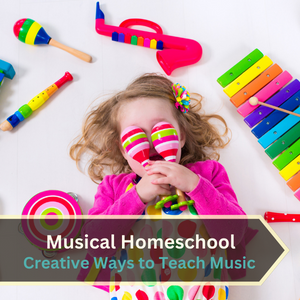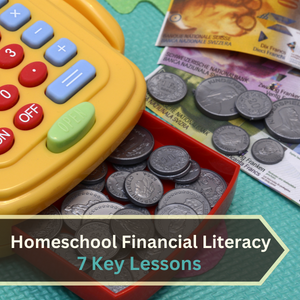The Importance of Music Education in Homeschooling
Music education plays a crucial role in a child’s comprehensive development. Integrating music into your homeschool curriculum can have far-reaching benefits beyond learning melodies and rhythms.
Benefits of Including Music in Homeschool Education
Music education fosters creativity, enhances cognitive skills, and supports emotional development. It stimulates different brain areas involved in language, reasoning, and memory. Music also encourages self-expression and helps build confidence.
How Music Education Enhances Creativity and Cognitive Skills
Music activities improve concentration, attention to detail, and critical thinking. Learning to read music and understand musical concepts develops mathematical and pattern-recognition skills. Music education also nurtures emotional intelligence and empathy by exploring different musical genres and cultures.
Choosing the Right Music Curriculum for Your Homeschool
Selecting a suitable music curriculum is key to effectively integrating music education into your homeschooling. It should align with both your educational goals and your child’s interests.
Tips on Selecting a Music Curriculum
Consider your child’s age, musical preferences, and learning style when choosing a curriculum. Some children might enjoy a more structured approach, while others may thrive with a more exploratory method. Balance is crucial – the curriculum should be challenging yet enjoyable.
Factors to Consider: Child’s Age, Musical Preferences, Learning Style
Younger children may benefit from a curriculum focusing on music appreciation and basic concepts, while older children may be ready for more advanced topics like music theory and composition. Tailor the curriculum to fit your child’s unique needs and interests.
Music Theory Basics for Homeschoolers
Music theory is the foundation of music education. Teaching the basics of music theory can help children understand the structure and language of music.
Introducing Fundamentals of Music Theory
Start with simple concepts such as rhythm, beats, and musical notation. Gradually introduce scales, key signatures, and the basics of harmony. Use engaging activities and games to make learning theory fun.
Recommended Product: Music Theory Fun Sheets
“Music Theory Fun Sheets” offers engaging worksheets that make music theory enjoyable for children. These sheets cover a range of topics, from note identification to rhythm exercises, and they provide a fun way to reinforce theoretical concepts.
Engaging with Music History and Appreciation
Music history and appreciation are integral parts of a well-rounded music education. They provide context to the music your child is learning and playing.
Teaching Music History and Appreciation
Introduce children to different musical eras, from classical to modern times. Discuss influential composers and their works. Use listening sessions to explore various styles and discuss each piece’s historical and cultural contexts.
Recommended Product: Classics for Kids
“Classics for Kids” is an excellent resource for teaching music history and appreciation. It offers interactive and educational content on classical music and composers, making it accessible and interesting for young learners.
Hands-On Music Lessons: Piano, Guitar, and More
Practical experience in playing an instrument is invaluable in music education. Hands-on lessons provide a deeper understanding of musical concepts and improve motor skills.
Options for Hands-On Music Lessons
Consider lessons in instruments like piano, guitar, violin, or singing. These lessons can be tailored to your child’s interests and skill level. Look for local music teachers or online lesson options.
Recommended Products: Hoffman Academy for Piano, Fender Play for Guitar
Hoffman Academy offers a comprehensive online piano program for beginners and advanced students. Fender Play provides interactive guitar lessons, making it easy and fun for homeschoolers to learn at their own pace.
Incorporating Music Appreciation into Daily Homeschool Routine
Music appreciation can be seamlessly integrated into your homeschooling routine, making it a natural and enjoyable part of your child’s daily learning experience.
Integrating Music Appreciation in Daily Activities
Consider dedicating a portion of each day or week to music appreciation. This could involve themed music weeks, where each week focuses on a different genre, composer, or culture. Listen to music during art projects or while studying history to provide a multisensory learning experience.
Examples of Music Appreciation Activities
Explore music from different cultures as part of geography lessons. During language arts, analyze song lyrics as poetry. Incorporate music-related documentaries or biographies into your curriculum to better understand music’s impact on society and history.
Making Music Fun with Interactive Games and Activities
Interactive games and activities are excellent ways to make music education enjoyable and engaging for children, helping to reinforce concepts learned during lessons.
Suggesting Music, Games, and Activities
Music Bingo, rhythm-matching games, and note-naming challenges are fun ways to learn music theory and notation. Consider improvisation games and composition activities to encourage creativity and self-expression in music.
Recommended Product: Music Bingo
“Music Bingo” is a fun, interactive game that helps reinforce musical knowledge. Players match musical symbols, terms, and notes, entertaining learning and reviewing music concepts.
Utilizing Technology in Homeschool Music Education
Technology plays a significant role in modern music education, offering diverse resources and tools to enhance learning.
The Role of Technology in Music Education
Online courses, music learning apps, and digital instruments provide convenient and innovative ways to learn music. These tools can offer interactive lessons, instant feedback, and a wide range of musical styles and techniques to explore.
Recommended Product: Prodigies Music Lessons
“Prodigies Music Lessons” offers online music education focusing on ear training, singing, and playing instruments. The program is designed to be accessible and engaging for children, making it an excellent resource for homeschoolers.
Building a Music Library: Essential Resources and Materials
A well-stocked music library is a valuable asset in homeschool music education, providing the resources needed to support and enhance learning.
Creating a Comprehensive Music Library
Your music library should include various sheet music, instructional books, and recordings. To provide a broad music perspective, consider resources covering different musical genres, cultures, and historical periods.
Recommended Product: Music Together
“Music Together” offers music resources, including CDs and songbooks, ideal for young learners. Their materials are designed to encourage family participation and enjoyment of music.
Music and Movement for Early Childhood Education
Combining music with movement activities is a highly effective way for young children to introduce music concepts and develop motor skills.
Importance of Music and Movement
Music and movement activities support physical development and coordination while providing a joyful and stimulating way to engage with music. These activities can include dancing, rhythm exercises, and interactive songs.
Recommended Product: Kindermusik
“Kindermusik” offers music and movement classes and resources specifically designed for early childhood education. Their programs focus on holistic development through music, providing a fun and nurturing environment for young learners.
Encouraging Musical Creativity and Composition
Fostering creativity and composition skills in music education allows children to express themselves and explore their musical ideas.
Nurturing Creativity in Music
Please encourage your child to create melodies, experiment with different instruments, or write songs. Provide opportunities for improvisation and collaborative music-making.
Recommended Product: GarageBand
“GarageBand” is a versatile music creation app that allows children to experiment with composing and recording music. It offers a range of instruments and tools to explore, making it a great platform for budding musicians.
Exploring Different Genres and Styles of Music
Exposing children to a variety of music genres and styles broadens their musical horizons and enhances their appreciation of music’s diversity.
Introducing Various Music Genres
Explore classical, jazz, folk, pop, and world music. Discuss the characteristics of each genre and its cultural and historical significance. Listen to a variety of artists and compositions to deepen understanding and appreciation.
Recommended Product: The Young Person’s Guide to the Orchestra
“The Young Person’s Guide to the Orchestra” is an educational resource that introduces children to the orchestra’s instruments and classical music. It offers an interactive and informative way to learn about orchestral music.
Enriching Your Homeschool Experience with Music
Incorporating music into your homeschool curriculum can transform your child’s educational experience. By exploring various music curriculum options, engaging in hands-on lessons, and integrating music into everyday learning, you can create a fun and comprehensive music education for your child.
Call to Action: Ready to make music a vibrant part of your homeschool journey? Explore our recommended resources and start enriching your child’s education with the joy of music today!




